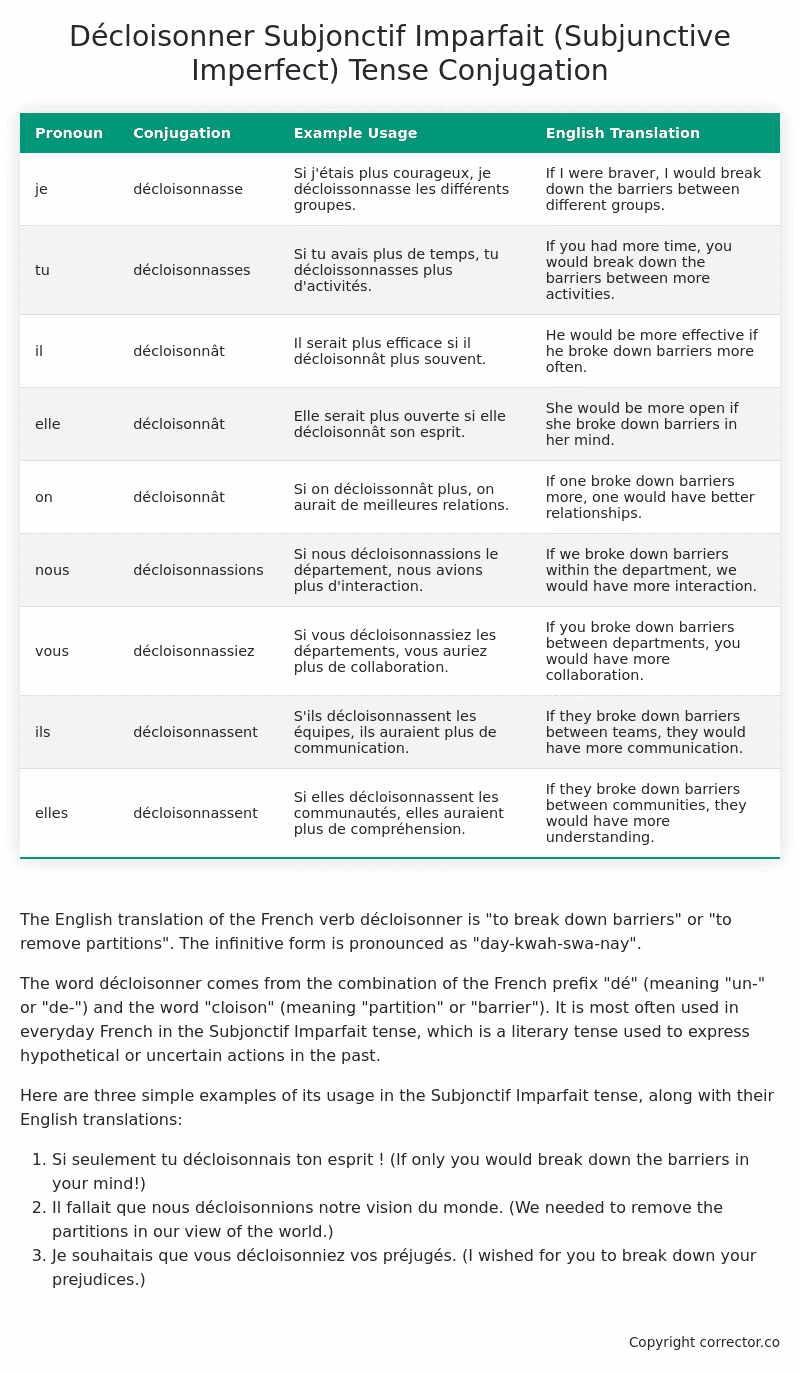Subjonctif Imparfait (Subjunctive Imperfect) Tense Conjugation of the French Verb décloisonner
Introduction to the verb décloisonner
The English translation of the French verb décloisonner is “to break down barriers” or “to remove partitions”. The infinitive form is pronounced as “day-kwah-swa-nay”.
The word décloisonner comes from the combination of the French prefix “dé” (meaning “un-” or “de-“) and the word “cloison” (meaning “partition” or “barrier”). It is most often used in everyday French in the Subjonctif Imparfait tense, which is a literary tense used to express hypothetical or uncertain actions in the past.
Here are three simple examples of its usage in the Subjonctif Imparfait tense, along with their English translations:
- Si seulement tu décloisonnais ton esprit ! (If only you would break down the barriers in your mind!)
- Il fallait que nous décloisonnions notre vision du monde. (We needed to remove the partitions in our view of the world.)
- Je souhaitais que vous décloisonniez vos préjugés. (I wished for you to break down your prejudices.)
Table of the Subjonctif Imparfait (Subjunctive Imperfect) Tense Conjugation of décloisonner
| Pronoun | Conjugation | Example Usage | English Translation |
|---|---|---|---|
| je | décloisonnasse | Si j’étais plus courageux, je décloissonnasse les différents groupes. | If I were braver, I would break down the barriers between different groups. |
| tu | décloisonnasses | Si tu avais plus de temps, tu décloissonnasses plus d’activités. | If you had more time, you would break down the barriers between more activities. |
| il | décloisonnât | Il serait plus efficace si il décloisonnât plus souvent. | He would be more effective if he broke down barriers more often. |
| elle | décloisonnât | Elle serait plus ouverte si elle décloisonnât son esprit. | She would be more open if she broke down barriers in her mind. |
| on | décloisonnât | Si on décloissonnât plus, on aurait de meilleures relations. | If one broke down barriers more, one would have better relationships. |
| nous | décloisonnassions | Si nous décloisonnassions le département, nous avions plus d’interaction. | If we broke down barriers within the department, we would have more interaction. |
| vous | décloisonnassiez | Si vous décloisonnassiez les départements, vous auriez plus de collaboration. | If you broke down barriers between departments, you would have more collaboration. |
| ils | décloisonnassent | S’ils décloisonnassent les équipes, ils auraient plus de communication. | If they broke down barriers between teams, they would have more communication. |
| elles | décloisonnassent | Si elles décloisonnassent les communautés, elles auraient plus de compréhension. | If they broke down barriers between communities, they would have more understanding. |
Other Conjugations for Décloisonner.
Le Present (Present Tense) Conjugation of the French Verb décloisonner
Imparfait (Imperfect) Tense Conjugation of the French Verb décloisonner
Passé Simple (Simple Past) Tense Conjugation of the French Verb décloisonner
Passé Composé (Present Perfect) Tense Conjugation of the French Verb décloisonner
Futur Simple (Simple Future) Tense Conjugation of the French Verb décloisonner
Futur Proche (Near Future) Tense Conjugation of the French Verb décloisonner
Plus-que-parfait (Pluperfect) Tense Conjugation of the French Verb décloisonner
Passé Antérieur (Past Anterior) Tense Conjugation of the French Verb décloisonner
Futur Antérieur (Future Anterior) Tense Conjugation of the French Verb décloisonner
Subjonctif Présent (Subjunctive Present) Tense Conjugation of the French Verb décloisonner
Subjonctif Passé (Subjunctive Past) Tense Conjugation of the French Verb décloisonner
Subjonctif Imparfait (Subjunctive Imperfect) Tense Conjugation of the French Verb décloisonner (this article)
Conditionnel Présent (Conditional Present) Tense Conjugation of the French Verb décloisonner
Conditionnel Passé (Conditional Past) Tense Conjugation of the French Verb décloisonner
L’impératif Présent (Imperative Present) Tense Conjugation of the French Verb décloisonner
L’infinitif Présent (Infinitive Present) Tense Conjugation of the French Verb décloisonner
Struggling with French verbs or the language in general? Why not use our free French Grammar Checker – no registration required!
Get a FREE Download Study Sheet of this Conjugation 🔥
Simply right click the image below, click “save image” and get your free reference for the décloisonner Subjonctif Imparfait tense conjugation!

Décloisonner – About the French Subjonctif Imparfait (Subjunctive Imperfect) Tense
Formation
Common Everyday Usage Patterns
Interactions with Other Tenses
Subjonctif Présent
Indicatif Passé Composé
Conditional
Conditional Perfect
Summary
I hope you enjoyed this article on the verb décloisonner. Still in a learning mood? Check out another TOTALLY random French verb conjugation!


